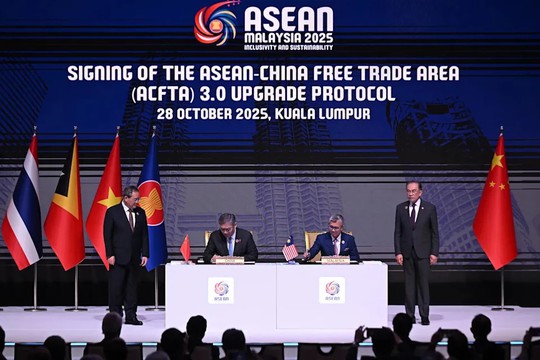Chinese Premier Li Qiang (far left) and Malaysian Prime Minister Anwar Ibrahim (far right) witness the signing of an upgraded free trade agreement between China and the Association of Southeast Asian Nations in Kuala Lumpur, Malaysia, on Oct. 28.
Photo: Malay Mail
China and the ASEAN bloc of Southeast Asian nations signed an upgrade to their free trade agreement, with leaders hailing the deal which spans the digital and green economy, and other new industries, Reuters reports.
The 11-member Association of Southeast Asian Nations is China's largest trading partner, with bilateral trade totalling $771 billion last year, according to ASEAN statistics.
China is seeking to intensify its engagement with ASEAN, a region with a collective gross domestic product of $3.8 trillion, to counter hefty import tariffs imposed by U.S. President Donald Trump's administration on countries around the world.
"We must accelerate trade and investment liberalisation and facilitation and strengthen industrial integration and interdependence," Chinese Premier Li Qiang said at the ASEAN leaders' meeting.
Beijing has been seeking to position itself as a more open economy, despite criticism from other major powers of its expanding export restrictions on rare earths and other critical minerals.
Improved Market Access
China has previously said the agreement would pave the way for improved market access in sectors such as agriculture, the digital economy and pharmaceuticals between China and ASEAN.
Both China and ASEAN are part of the Regional Comprehensive Economic Partnership, the world's largest trading bloc, which covers nearly a third of the global population and about 30% of global gross domestic product. Malaysia hosted an RCEP summit in Kuala Lumpur on Monday, the first in five years.
The bloc is seen by some analysts as a potential buffer against tariffs imposed by the United States, though its provisions are considered weaker than some other regional trade deals due to competing interests among its members.
"The world must not slip back to the law of the jungle where the strong prey on the weak," Premier Li said at a different event on Monday.
"We should more firmly uphold the free trade regime, create a high-standard regional free trade network, and vigorously and effectively advance regional integration."
“The 3.0 FTA will help lower trade barriers”
China and ASEAN officially signed the upgraded China-ASEAN Free Trade Area (FTA) 3.0 Upgrade Protocol, marking a major step forward in regional economic integration. The signing took place during the 47th ASEAN Summit held in Malaysia, ‘The Global Times’ writes.
The 3.0 Upgrade Protocol covers nine major areas, adding five new ones — digital economy, green economy, supply chain connectivity, competition and consumer protection, and support for micro, small and medium-sized enterprises. The protocol reflects both sides' shared commitment to jointly shaping global trade rules and deepening cooperation in emerging sectors, CCTV News reported on Tuesday.
According to China's Ministry of Commerce, the two sides will now complete their respective domestic approval procedures to ensure the protocol takes effect as soon as possible.
Wichai Kinchong Choi, senior expert at Thailand's Kasikorn Bank, told ‘The Global Times’ that after decades of rapid growth, China's focus on high-quality development across economic, social, cultural and environmental spheres has become increasingly evident. The government has introduced clear measures to promote steady and balanced progress, emphasizing innovation-driven growth, green development, and win-win cooperation under globalization and multilateralism.
"In Thailand, we've seen that recent Chinese investment is shifting toward high-tech, new energy, and connectivity — sectors where China holds clear advantages in technology and cost efficiency," Choi said. "These high-quality investments bring higher value-added, stronger market competitiveness, and more sustainable growth."
Rich Too, CEO of independent thinktank SEEDS Malaysia, told ‘The Global Times’ that the signing of the China-ASEAN Free Trade Area (FTA) 3.0 Upgrade Protocol holds profound significance for ASEAN economies, particularly after the US imposed tariffs on the region. He said the agreement will further strengthen China-ASEAN trade ties, deepen regional integration, and inject new momentum into multilateral free trade in the region.
"As global uncertainty rises, closer China-ASEAN trade cooperation is both necessary and inevitable," Too said. "The 3.0 FTA will help lower trade barriers, enable freer flows of goods and capital, and foster an open, fair, and inclusive market benefiting both sides."
read more in our Telegram-channel https://t.me/The_International_Affairs

 11:28 30.10.2025 •
11:28 30.10.2025 •























